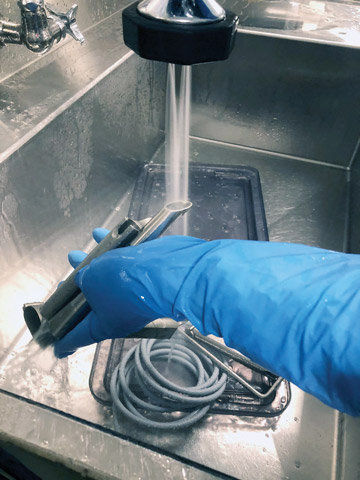Emphasizing the importance of instrument precleaning sounds simple enough, but it can be a struggle to make sure it's done consistently and effectively. That's where strong leadership comes into play. Your OR directors and sterile processing managers
need to develop a good working relationship. They both need to understand how long it takes to reprocess instrument trays, the steps involved and why cutting corners at any point in the process can negatively affect patient care. They also
need to understand the risks involved if reprocessing steps are skipped.
Building a relationship between these two departments will also create accountability among members of the surgical team, because they'll understand the importance of precleaning instruments, appreciate how long it takes to reprocess trays, realize
that the job can't be rushed and realize it's best to let sterile processing techs do their job to keep things moving along at an efficient pace.
Getting both groups to work in concert demands clear communication and a willingness to cooperate, and building that bond isn't something that happens overnight. The OR and SPD speak different clinical languages, which can often cause misunderstandings.
It's important that team members in both areas learn to communicate clearly and constructively. It's a two-way street: The OR needs to fully understand the processes in place in sterile processing, and reprocessing techs need to understand
how instruments are used in the ORs and the importance of returning the tools to surgical teams as quickly as possible.
Both groups are constantly under a lot of pressure and it pays to remain calm, cool and collected. If the OR is giving off high-strung, stressed-out energy, reprocessing techs need to stay as relaxed as possible and filter out the noise to make
sound, proper decisions. If they're stressed out and give into that stress, they could skip an important instrument reprocessing step, which could jeopardize safe patient care. Everyone in your facility must have the patient in mind at all
times.
One thing I always tell my reprocessing staff is that no matter how much pressure they might be feeling from the OR to reprocess instruments quickly, they must not skip the critical step of putting instrument trays through an automatic washer.
If the OR needs a tray to be reprocessed immediately, a frazzled reprocessing tech might quickly handwash the instruments and soak them for a minute or less —or maybe not at all. The tray would get manually scrubbed down, rinsed off
and then pushed through to techs who'd ready it for sterilization, rather than getting run through an ultrasonic cleaner —which uses mechanical vibrations to agitate a cleaning solution to aid in the removal of soil from the surfaces
of surgical devices —and soaked for several minutes.
If you have good, strong surgical leaders who understand what goes into reprocessing instrument trays, they will likely pass this knowledge along to the rest of the OR staff. But sometimes, seeing and experiencing what goes on in the sterile processing
department is the education surgical teams need to get on board with properly precleaning instruments. OR staff are frequently amazed at how long it takes to reprocess even a basic instrument tray, and seeing reprocessing techs in action gives
them a better appreciation of the pressures their colleagues face on a daily basis. When OR staff members come down to our sterile processing department, they've actually said, "Oh, my gosh, I had no idea you had to walk this far!" and "I
can't believe the phone rings that much!"
You never know what your coworkers are going through until you're in their shoes. The OR will often schedule cases back to back to back, even though there's only one instrument tray available for all three cases. When the day of surgery comes,
the surgical team is asking the SPD why the tray isn't ready, unaware there is only one tray and it takes four hours to reprocess. They're frantically calling the department manager, saying the patient is on the table and the surgeon is upset.
As soon as the OR mentions the patient, members of the reprocessing team start to feel an enormous amount of pressure to get the tray back to the OR as quickly as possible. These types of situations can be prevented if both departments learn
to work with, not against, each other.
.svg?sfvrsn=be606e78_3)

.svg?sfvrsn=56b2f850_5)